To Compete or not to Compete?
A Study on the Competitive Sports Question
As a youth I loved playing sports—volleyball, soccer, football, you name it. But through the years there were a few instances that prompted questions in my mind on the prudence of competitive sports. For example, on more than one occasion the opposing side of the volleyball team at my “Christian” school I knew had cheated in order to win. Then there was my classmate who ran so hard in order to win a race that he hyperventilated, collapsed and almost died—what if he had, I thought—was it worth it? Even the sports fans weren’t immune. Later in life, I was appalled to hear of the guy at my husband’s work that, when his team on TV lost the game, said that he wanted to “kill the coach” on his team for making a mistake and causing his team to lose. And he was serious too. He was fuming mad.
The sports world certainly didn’t always seem to improve health and neither did it seem to breed the fruits of the Spirit.
"But the fruit of the Spirit is love, joy, peace,
longsuffering, gentleness, goodness, faith, meekness, temperance: against
such there is no law." Gal. 5:22,23
" (For the fruit of the Spirit is in all goodness and righteousness and truth;)" Eph. 5:9
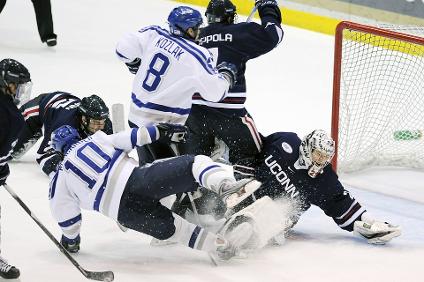
There are actually many scientific studies that show that sports actually increase aggressive behavior.
An article by Steinhardt University’s Department of Applied Psychology states that,
“Research has shown that men who participate in organized sports exhibit more aggressive behaviors, in both athletic and non-athletic contexts, than those who do not. These behaviors include bullying, sexual violence, and physical aggression (Forbes, Adams-Curtis, Pakalka, & White, 2006). Athletes also tend to hold more positive attitudes toward violence than do non-athletes (Forbes, Adams-Curtis, Pakalka, & White, 2006)…Sexual assault, or the act of forcing someone to engage in sexual acts, is also commonly associated with participation in organized sports (Gage, 2008; Koss, 1993).” https://steinhardt.nyu.edu/appsych/opus/issues/2015/fall/passero
Hmm…Maybe we should consider some Biblical principles when choosing how to spend our time. Here are a few Bible texts to consider. It is important to recognize these two principles when we are choosing how to spend our time.
Is the activity helping us toward heaven?
Col 3:1,2 states, “If ye then be risen with Christ, seek those things which are above, where Christ sitteth on the right hand of God. Set your affection on things above, not on things on the earth.”
Can it be played in the name of the Lord and for God’s glory?
Col 3:17 counsels, “And whatsoever ye do in word or deed, do all in the name of the Lord Jesus, giving thanks to God and the Father by him.”
1 Cor. 10:31 reiterates, “Whether therefore ye eat, or drink, or whatsoever ye do, do all to the glory of God.”
Remember what Luke 16:15 says, “And he said unto them, Ye are they which justify yourselves before men; but God knoweth your hearts: for that which is highly esteemed among men is abomination in the sight of God.”
So just because an activity is lauded as good by the world doesn’t necessarily mean God approves of it.
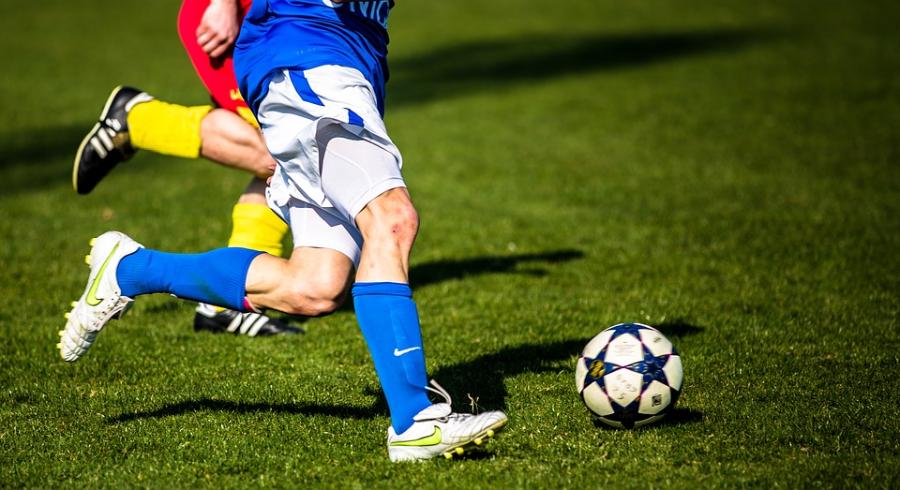
Now let’s look at the origins of Competition. According to Webster’s 1828 dictionary the word competition means:
COMPETITION, n.
1. The act of seeking, or endeavoring to gain, what another is endeavoring to gain, at the same time; rivalry; mutual strife for the same object; also, strife for superiority; as the competition of two candidates for an office, or of two poets for superior reputation.
Note the words strife and rivalry in this definition because we will see these again later in the study.
We see this “strife for superiority” began in heaven with Satan or Lucifer.
“How art thou fallen from heaven, O Lucifer, son of the morning! how art thou cut down to the ground, which didst weaken the nations!
For thou hast said in thine heart, I will ascend into heaven, I will exalt my throne above the stars of God: I will sit also upon the mount of the congregation, in the sides of the north: I will ascend above the heights of the clouds; I will be like the most High.” Isaiah 14:12-14
Note that competition means strife—and the Bible cautions and lists among the works of the flesh-- strife, envying, and emulation.
“Now the works of the flesh are manifest, which are these; Adultery, fornication, uncleanness, lasciviousness, idolatry, witchcraft, hatred, variance, emulations, wrath, strife, seditions, heresies,envyings, murders, drunkenness, revellings, and such like: of the which I tell you before, as I have also told you in time past, that they which do such things shall not inherit the kingdom of God.” Gal. 5:19-21
Here are the meanings of those words from Webster’s 1828 dictionary followed by the verses they are used in.
Envy --EN'VY, v.t.
1. To feel uneasiness, mortification or discontent, at the sight of superior excellence, reputation or happiness enjoyed by another; to repine at another's prosperity; to fret or grieve one's self at the real or supposed superiority of another, and to hate him on that account.
Strife--STRIFE, n.
1. Exertion or contention for superiority; contest of emulation, either by intellectual or physical efforts. Strife may be carried on between students or between mechanics.
2. Contention in anger or enmity; contest; struggle for victory; quarrel or war.
Emulation--EMULA'TION, n.
The act of attempting to equal or excel in qualities or actions; rivalry; desire of superiority, attended with effort to attain to it; generally in a good sense, or an attempt to equal or excel others in that which is praise-worthy, without the desire of depressing others. Rom 11. In a bad sense, a striving to equal or do more than others to obtain carnal favors or honors. Val.5.
1. An ardor kindled by the praise-worthy examples of others, inciting to imitate them, or to equal or excel them.
2. Contest; contention; strife; competition; rivalry accompanied with a desire of depressing another.
Note that the word “competition” is actually used as a definition of emulation. And the word “rivalry” is used both in the definition of competition and emulation.
What does the Bible say concerning these words?
Can we actually compete to be superior to others and follow these Biblical principles?
"Let nothing be done through strife or vainglory; but in lowliness of mind let each esteem other better than themselves.” Philippians 2:3
“But if ye have bitter envying and strife in your hearts, glory not, and lie not against the truth. This wisdom descendeth not from above, but is earthly, sensual, devilish. For where envying and strife is, there is confusion and every evil work. But the wisdom that is from above is first pure, then peaceable, gentle, and easy to be intreated, full of mercy and good fruits, without partiality, and without hypocrisy.” James 3:14-17
“And they that are Christ's have crucified the flesh with the affections and lusts. If we live in the Spirit, let us also walk in the Spirit. Let us not be desirous of vain glory, provoking one another, envying one another.” Galatians 5:24-26
“For ye are yet carnal: for whereas there is among you envying, and strife, and divisions, are ye not carnal, and walk as men? For while one saith, I am of Paul; and another, I am of Apollos; are ye not carnal?” 1 Cor. 3:3,4
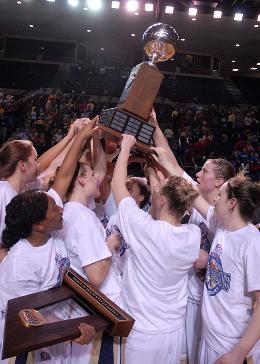
Listen
to this quotation that was written over a hundred years ago, yet shows the
effect of sports today on the character of people.
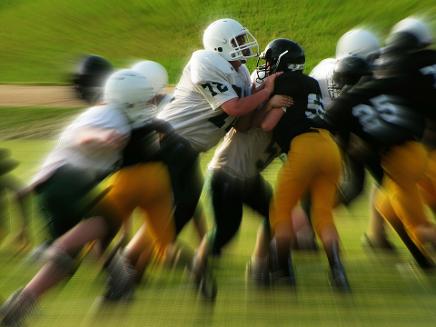
“Some of the most popular amusements, such as football and boxing, have become schools of brutality. They are developing the same characteristics as did the games of ancient Rome. The love of domination, the pride in mere brute force, the reckless disregard of life, are exerting upon the youth a power to demoralize that is appalling.
Other athletic games, though not so brutalizing, are scarcely less objectionable, because of the excess to which they are carried. They stimulate the love of pleasure and excitement, thus fostering a distaste for useful labor, a disposition to shun practical duties and responsibilities. They tend to destroy a relish for life's sober realities and its tranquil enjoyments. Thus the door is opened to dissipation and lawlessness, with their terrible results.” {Counsels on Health pg. 189 }
Consider these studies on the results of competitive sports.
“A New Zealand study of a thousand 15-18 year old boys and girls found that juvenile delinquency is greater for those involved in competitive sports. Boys heavily involved in sports at age 15 were twice as likely to be delinquent as their peers at age 18. Girls similarly involve in sports at age 15 were almost three times as likely to be delinquent as their peers at age 18.” (Proof Positive by Nedley, M.D. pg 312)
“METHODS: Members of a longitudinal cohort study were interviewed at ages 15 and 18 years and, among other topics, were asked questions relating to involvement in physical activity and delinquent behaviour. Logistic regression models were used to examine the relation between sports involvement and delinquency at age 15 years and delinquency at age 18. RESULTS: After controlling for delinquent behaviour and psychosocial factors at age 15, females with moderate or high levels of sporting activity, and males with high levels of sporting activity, were significantly more likely to be delinquent at age 18 years than those with low levels of sporting activity.” (Br J Sports Med. 1996 Dec; 30(4): 335–341.) https://www.ncbi.nlm.nih.gov/pmc/articles/PMC1332421/
Here is a modern study by Washington State University also showing that competitive sports negatively affect the moral reasoning.
“Moral reasoning among athletes is at a record low and declining rapidly, according to 18 years of research and statistics gathered by WSU’s [Washington State University] Jennifer Beller, and University of Idaho’s Sharon Stoll…. ‘Athlete populations score significantly lower on moral reasoning inventories than do nonathlete populations,’ said Beller. The reason for the difference is that many socially unacceptable standards are taught, reinforced and modeled in athletics. And statistics show that ‘the longer one is in athletics, the more affected and calloused one’s moral reasoning becomes.’… ‘Opposing athletes become your enemy or an object. When they are an object, it’s okay to violate them or ‘take them out.’ In sports like football and hockey it’s easier because faces are hidden behind helmets and masks, larger bodies are exaggerated and protected by padding and other gear, and brute force against an opponent is lauded. For many, today’s athletic philosophy includes “do to others before they do to you.’” https://news.wsu.edu/2005/12/02/moral-reasoning-and-teaching-found-lacking-in-sports-society/
Another study showed the negative influence of sports on the character of athletes.
“1600 MALE HIGH SCHOOL SENIORS WERE ANALYZED
AS TO THE EFFECT OF PARTICIPATION IN VARSITY ATHLETICS
The effects:
· Increased aggression
· Increased irritability
· Reduced honesty
· Decreased self-control
· Decreased independence
· Slight increase in self-esteem”
(Proof Positive by Nedley, M.D. pg 311 from a study by anthropologist Andrew Miracle and 2 other scientists published in Social Science Journal 1990;27(3):303-315)

The only “positive effect” in the above study was “self-esteem”. But consider that what is deemed self-esteem by the world, might easily be considered pride by God.
The Bible warns against pride.
“Pride goeth before destruction, and an haughty spirit before a fall.” Prov. 16:18
Instead of our self-worth coming from what we can do, it is to come from knowing God.
"Thus saith the Lord, Let not the wise man glory in his wisdom, neither let the mighty man glory in his might, let not the rich man glory in his riches: but let him that glorieth glory in this, that he understandeth and knoweth Me, that I am the Lord which exercise loving-kindness, judgment, and righteousness, in the earth: for in these things I delight. . . ." Jer.9:23,24
Is it possible that competitive sports “fuel” or are the result of the sins of Sodom?
“Behold, this was the iniquity of thy sister Sodom, pride, fulness of bread, and abundance of idleness was in her and in her daughters, neither did she strengthen the hand of the poor and needy.” Ezekiel 16:49
According to the scriptures, we are to treat others, as we would like to be treated.
“And the second is like, namely this, Thou shalt love thy neighbour as thyself. There is none other commandment greater than these.” Mark 12:31
Let love be without dissimulation. Abhor that which is evil; cleave to that which is good. Be kindly affectioned one to another with brotherly love; in honour preferring one another; Rom 12:9,10
But competitive sports, affecting both those on the field and those watching from the bleachers or the couch, are made violent for a reason. Ponder this statement from Albert Applin, vice chancellor of the United States Sports Academy in Daphne, Ala.
``In TV programing,'' Applin says, ``violence sells and brings people back. It's the same in pro sports; violence adds a little something to the game and people hope to see it. I don't think it's necessarily good for people, but that's the way it is.'' https://www.csmonitor.com/1994/0106/06021.html

One might also consider whether competitive sports lend to idolatry and the worship of man in place of God. I find interesting the wording used in the story of the children of Israel worshipping the golden calf. “And they rose up early on the morrow, and offered burnt offerings, and brought peace offerings; and the people sat down to eat and to drink, and rose up to play.” Exodus 32:6
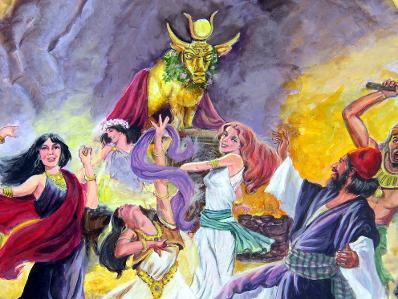
Consider the Strong’s Concordance meaning of the Hebrew word which is translated “to play”
H6711 צחק
tsâchaq tsaw-khak'
A primitive root; to laugh outright (in merriment or scorn); by implication to sport: - laugh, mock, play, make sport.
A warning against repeating this practice is given in the New Testament.
“Neither be ye idolaters, as were some of them; as it is written, The people sat down to eat and drink, and rose up to play. 1 Cor. 10:7
Here is the Strong’s Concordance meaning for the Greek word translated “to play”.
G3815 παίζω paizō paheed'-zo
From G3816; to sport (as a boy): - play.
Both of the instances of "to play" could be translated sport or to sport. While we don't know exactly what it was that the Israelites did, it is certainly an instance of idolatry that no Christian should care to copy.
Whatever the case, competitive sports and their players are often placed in a position belonging to God alone.
A Sporting News headline for Sept. 25, 2015 asks, “Are Professional Athletes Worthy of the Hero Worship They Receive?”
What about the enormous amount of time spent
on sports? I know of a little boy who
frequently walked in and said, “Daddy won’t you come for a walk with me?” but
Daddy was always too busy watching the competition on TV to take time for his
son.
If families and friends are obviously neglected— is God also often neglected when sports come into the picture? Consider the 1st commandment. “And God spake all these words, saying I am the LORD thy God… Thou shalt have no other gods before me.” Exodus 20:1-3
This quotation from a book called Fundamentals of Christian Education is perhaps one of the best reasons I have found to avoid competitive sports. “I cannot find an instance in the life of Christ where He devoted time to play and amusement. He was the great Educator for the present and the future life. I have not been able to find one instance where He [Christ] educated His disciples to engage in amusement of football or pugilistic games, to obtain physical exercise, or in theatrical performances; and yet Christ was our pattern in all things.” {FE 229.2}
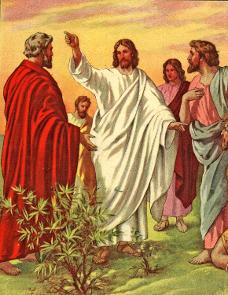
It is evident that the Greeks and Romans participated in competitive sports in Christ day. In fact, archaeologists have recently unearthed an amphitheater in Jerusalem.

The following are a few quotations showing that indeed there were sporting events in Christ day and although even though the corrupt priesthood may have sometimes frequented them we have no record of Christ or His disciples doing so.
“The Greek games were performed in Jerusalem itself, and Jewish youth, dressed only in the scarf and broad hat in imitation of the god Hermes, wrestled like the Athenian athletes. It is stated by Dr. Mears that the priests, when the signal was given for the sports, left their work in the temple to watch the games. … the Israelites had now chosen Greece in place of God.”
({1901 SNH, SDP 191.1} The Story of Daniel the Prophet by S N Haskell)
Biblically, it is of interest that not only is there no record of Christ or his disciples playing competitive sports, but Jesus actually warned against this and many other idolatrous practices of Herod. “And he [Jesus] charged them, saying, Take heed, beware of the leaven of the Pharisees, and of the leaven of Herod.” Mark 8:15
We must go to history to find out what exactly Herod was doing. Consider this quotation from Antiquities of the Jews.
“ON this account it was that Herod revolted from the laws of his country, and corrupted their ancient constitution, by the introduction of foreign practices, which constitution yet ought to have been preserved inviolable; by which means we became guilty of great wickedness afterward, while those religious observances which used to lead the multitude to piety were now neglected; for, in the first place, he appointed solemn games to be celebrated every fifth year, in honor of Caesar, and built a theater at Jerusalem, as also a very great amphitheater in the plain. Both of them were indeed costly works, but opposite to the Jewish customs; for we have had no such shows delivered down to us as fit to be used or exhibited by us; yet did he celebrate these games every five years, in the most solemn and splendid manner. He also made proclamation to the neighboring countries, and called men together out of every nation. The wrestlers also, and the rest of those that strove for the prizes in such games, were invited out of every land, both by the hopes of the rewards there to be bestowed, and by the glory of victory to be there gained. So the principal persons that were the most eminent in these sorts of exercises were gotten together, for there were very great rewards for victory proposed, not only to those that performed their exercises naked, but to those that played the musicians also, and were called Thymelici; and he spared no pains to induce all persons, the most famous for such exercises, to come to this contest for victory.
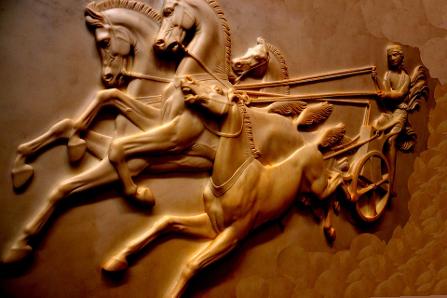
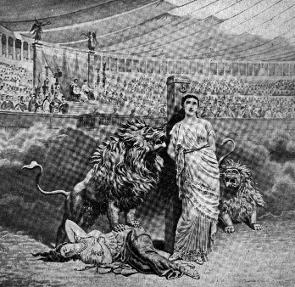
Inscriptions also of the great actions of Caesar, and trophies of those nations which he had conquered in his wars, and all made of the purest gold and silver, encompassed the theater itself; nor was there any thing that could be subservient to his design, whether it were precious garments, or precious stones set in order, which was not also exposed to sight in these games.
And truly foreigners were greatly surprised and delighted at the vastness of the expenses here exhibited, and at the great dangers that were here seen; but to natural Jews, this was no better than a dissolution of those customs for which they had so great a veneration. (13) It appeared also no better than an instance of barefaced impiety, to throw men to wild beasts, for the affording delight to the spectators; and it appeared an instance of no less impiety, to change their own laws for such foreign exercises: but, above all the rest, the trophies gave most distaste to the Jews; for as they imagined them to be images, included within the armor that hung round about them, they were sorely displeased at them, because it was not the custom of their country to pay honors to such images.” (Antiquities of the Jews, Book 15, Chapter 8)

For we are told, “Satan has devised a multitude of ways in which to keep men from serving God. He has invented sports and games, into which men enter with such intensity that one would suppose a crown of life was to reward the winner. At the horse races and football matches, which are attended by thousands and thousands of people, lives for which Christ shed His blood are thrown away. What will become of the souls of the men and boys whose lives are thus extinguished? Will they be counted worthy of the redemption which Christ died to secure for them?” {RH, September 10, 1901 par. 5}

Let us head the warning found in 2 Timothy and turn away from those who are lovers of pleasure more than lovers of God. “This know also, that in the last days perilous times shall come. For men shall be lovers of their own selves, covetous, boasters, proud, blasphemers, disobedient to parents, unthankful, unholy, Without natural affection, trucebreakers, false accusers, incontinent, fierce, despisers of those that are good, Traitors, heady, highminded [conceited], lovers of pleasures more than lovers of God; Having a form of godliness, but denying the power thereof: from such turn away.” 2 Timothy 3:1-5
Let us firmly stand for truth like Moses in Egypt, “Choosing rather to suffer affliction with the people of God, than to enjoy the pleasures of sin for a season;” Heb. 11:25
While the Christian may derive exercise, fresh air and happiness from useful labor and cooperative recreation like canoeing or hiking without compromising truth, let us not forget to strive for the highest prize.
The worldling strives only “to obtain a corruptible crown”; but the Christian runs “with patience the race that is set before” him “that he may obtain…an incorruptible” crown. ( Heb. 12:1; 1 Cor. 9:24,25, )
Let us say with Paul, “ I have fought a good fight, I have finished my course, I have kept the faith: henceforth there is laid up for me a crown of righteousness, which the Lord, the righteous judge, shall give me at that day: and not to me only, but unto all them also that love his appearing.” 2 Timothy 4:7,8
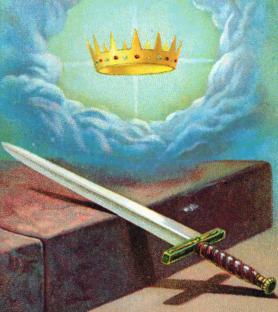

|
To Compete or not to Compete.pdf Size : 1084.997 Kb Type : pdf |